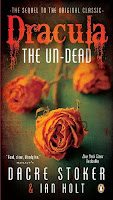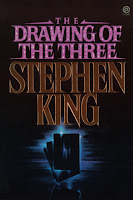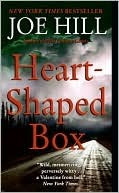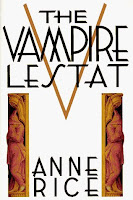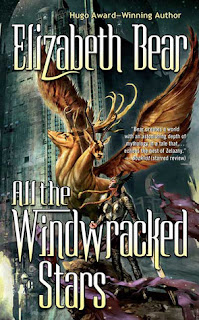 The Vampire Lestat by Anne Rice
ISBN: 0-394-53443-3
Blurb:
The Vampire Lestat by Anne Rice
ISBN: 0-394-53443-3
Blurb:
As the novel opens, Lestat, having risen from the earth after a fifty-five years' sleep, and infatuated with the modern world, presents himself in all his vampire brilliance as a rock star, a superstar, a seducer of millions. And, in this blaze of adulation, daring to break the vampire oath of silence, he determines to tell his story, to rouse the generations of the living dead from their slumbers and to penetrate the riddle of his own existence.
***
My Thoughts:
Okay, so the actual blurb goes on for three more paragraphs outlining the whole novel - too long and sort of boring, if you ask me. The bit I used says enough and who doesn't know about the vampire Lestat?
I can't rightly tell you what motivated me to read this book after my
lukewarm feelings for
Interview with the Vampire. It was likely a combination, of "Hey my sister lent this to me
ages ago" and the nagging feeling that I really do need to make an effort to read every vampire novel, no matter how dreadful. Oh, and it's famous, so that's gotta count for something, right? At least I can now return this to its rightful owner and clear up some shelf-space.
Now, it wasn't utterly horrible, but alas, alack and well-a-day, there sure was a ton of whining, especially in the first 200 or so pages. I liked Lestat the ruthless killer. I don't like Lestat the whiner. Listening to him go on about how "Oh, no one ever loved me," and "Life never gave me anything that it didn't immediately take away," and "Oh woe is me, I'm going to break all the rules and piss everyone off and then whine and moan about how alone I am" got really old, really fast. Even when he embraced what he was it was as an act of defiance, not because he truly was coming to term with being a vampire. Gone was the cold-hearted Lestat of
Interview and here was a more impulsive, active version of Louis. But hey, at least he calls Louis a filthy liar for the things he said in the previous book. Way to state the obvious, the obvious being that first person narrators are unreliable.
Qualms about Lestat's metaphorical "de-fanging" aside, I really enjoyed the setting - Paris in the 1800s was beautiful and romantic. I loved the focus on art and artists. The atmosphere kept me reading when all I really wanted to do was throttle Lestat - "oh everything is meaningless, but at least we have beauty." Also, I suspect his philosophical moaning would have appealed to a younger, less jaded Doomwench, one that still believed in the power of art and thought that being surrounded by other passionate artists could make a difference. Current Doomwench is fully aware that she will never have a coterie of crazy artist friends, so at least she won't have to listen to a lot of angsty raving (being a hermit has its advantages).
Umm, where was I? Right, the setting. Lestat's time in the theater and living in near poverty as an actor with his crazy violinist Nicolas was definitely one of the better parts (even if it included a fair bit of whining). A highlight of the Paris years was going into the crypt in les Innocents to meet the vampire coven (I won't go into detail to keep from spoiling it, but it was
good). The histories of Armand and Marius each add some perspective to Lestat's
worldview and make for decent foils to his impulsive character.
I guess the story overall was interesting enough, and the explanation of the origins of the vampires was not the usual one. And origin stories really are pivotal to our understanding, so the importance of this myth to Lestat and some of the other vampires made them very human. While I was trudging through this novel I was also reading a non-fiction book about vampires, specifically the evolution of the vampire with a close focus on some of Anne Rice's work. The author of that book made a good point about the change in Lestat's character from being an evil rogue in
Interview with the Vampire to being a whiny, deeply emotional fellow in his own book: it's hard to keep vampires evil when they have become so human. They aren't the monstrous Other anymore, instead they are the point of identification (this is a really crude paraphrase of Milly Williamson's thoughts in
The Lure of the Vampire: Gender, Fiction and Fandom from Bram Stoker to Buffy). I personally find this problematic, but that's why I'm writing a thesis. Let's get back to reviewing a book, shall we?
Ultimately, I think I missed the proverbial boat when it comes to reading these novels. When I was 18 I probably would have fallen in love with the florid prose and the continuous angst, but now I hover between bored and annoyed. Lestat is just too perfect - he's a golden boy who gets everything he wants and if things look like they might get too tough there's a new source of greater power for him. No matter how badly damaged he is in battle, he doesn't die and he continues on, whining about rules and how things never go his way (when things always go his way). I'm left disappointed, because he doesn't grow as a character, not really, and neither do the other vampires, regardless of how much time Rice spends describing how they have to adjust to each new age or perish. I believe it's best for everyone involved if I halt my perusal of
The Vampire Chronicles here, at a point where most people will say the books are still good, rather than forcing myself to go on to the "lesser" novels. Now, I'm off to find a palate cleanser.







